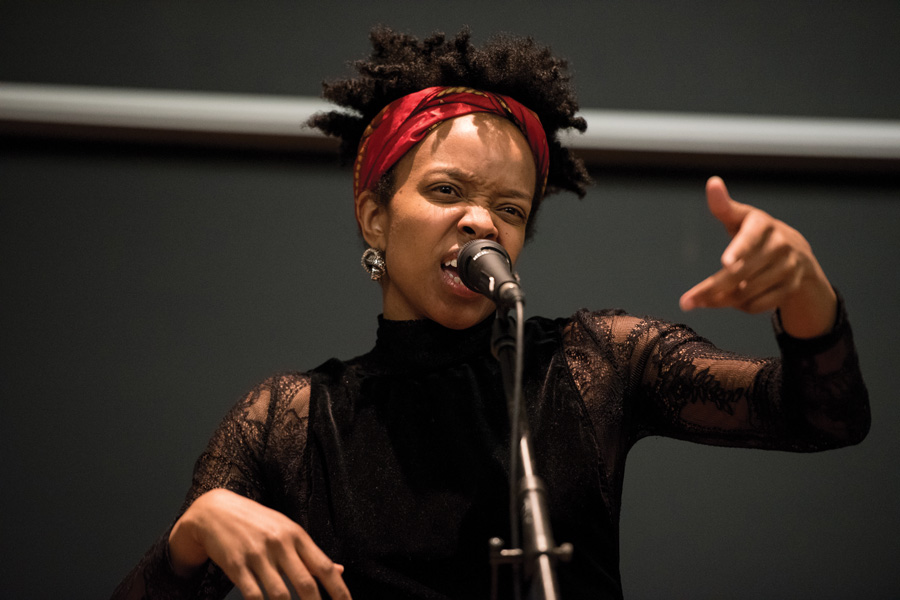Chicago hip-hop artists, activists discuss role of hip-hop music in activism
Colin Boyle/Daily Senior Staffer
Chicago hip-hop artist Jamila Woods performs at an event hosted by Northwestern Community Development Corps in Fisk Hall on Wednesday. Woods was part of a panel that discussed hip-hop and social activism.
May 25, 2017
Prominent black Chicago hip-hop artists and activists said during an event Wednesday that black women should engage in activism through art as it promotes the liberation of people of color.
The panelists spoke about the role of black women in the music industry, art as a form of activism and the value of self-love to about 80 people in Fisk Hall. Panelists included hip-hop artists TASHA and Jamila Woods; and Jaquanda Villegas and Jacinda Bullie, two founders of Kuumba Lynx, an urban arts education organization.
Performances by TASHA, Jamila Woods and groups from Kuumba Lynx followed the panel. The event was hosted by Northwestern Community Development Corps along with support from the Freshman Urban Program, Contemporary Thought Speaker Series and the Peace Project.
NCDC chose to focus its spring event on hip-hop because it is a topic that excites many students on campus, said Weinberg senior Jessica Lewis, outgoing co-chair of NCDC. Lewis told The Daily the group cares about hip-hop and discussing the genre’s role in activism.
“When we realized how much energy was around it and how much people wanted to talk about it, then we were ready to make it a more regular thing,” Lewis told The Daily.
During the event, the panelists discussed the role of art in social activism. Bullie said art and social activism are tied together. Art always tends to be political because it is an expression of the circumstances people are dealt, she said.
“Art is in and of itself something radical when women, black women (and) queer black women take up space we’re not supposed to tell a story, that’s artivism,” said TASHA, whose real name is Tasha Viets-VanLear.
The panelists acknowledged that “artivism” could hinder black women in the music industry. Woods said black women artists are often “put in a box” because they are encouraged to produce music focused on activism, which takes away from their artistry.
The panelists also discussed the role of empathy and activism, especially on NU’s predominantly white campus. Bullie said the group had thought about this before the event and came up with a list of five things for the audience to remember. The list includes letting women and femmes get the mic, practicing allyship, interrogating personal privilege, remembering to love black lives and putting money toward community development, Bullie said.
“Invest in some of the work that is being done to liberate and to change our city,” Bullie said.
The Kuumba Lynx organization is an example of the grassroots activism the panelists said was important. Several groups from the organization performed original poems, songs, dance routines and raps that spoke about their experiences being black teens from Chicago.
In addition to activism, TASHA said it is important for people to appreciate their own abilities and take personal time. TASHA performed her song “Lullaby,” which she said is intended to remind black women that it’s OK to take days for themselves.
Lewis she said she felt “close to happy tears” while at the event.
“You could feel so much love and excitement and passion in the room all at once. I thought it was beautiful,” Lewis told The Daily.
Email: [email protected]
Twitter: @juliaesparza10












